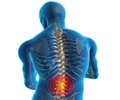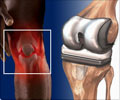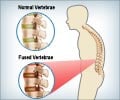Causes of Ankylosing Spondylitis
The exact cause for ankylosing spondylitis is unknown and unclear, but genes seem to play an important role in the development of the condition.
Scientists have identified a specific gene, known as HLA-B27 (human leukocyte antigen B27), which is closely associated with the development of ankylosing spondylitis.
Risk factors for developing ankylosing spondylitis include -
- Gender - Men are affected more commonly than women.
- Age - Individuals between 15-40 years of age are most commonly affected.
- Hereditary - Heredity plays a major role in predisposing to the disease. Ankylosing spondylitis is often present in persons whose relatives are already affected by it.
- Colon Ulcers - Patients with bowel ulcers are at a risk of developing ankylosing spondylitis.
- Reiter's disease - Reiter's disease is a joint disease, where multiple joints of the body are affected. Patients affected by Reiter's disease are more susceptible to ankylosing spondylitis.









